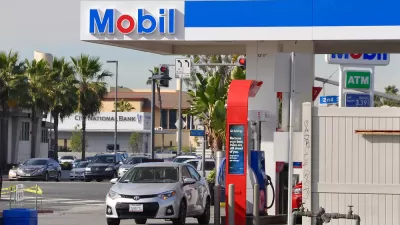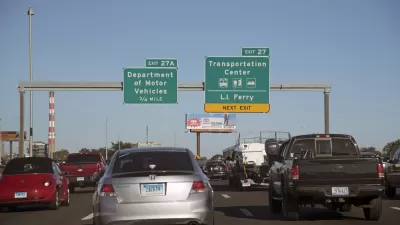The nation's largest oil and natural gas producer is flush with revenue from energy production. If Gov. Rick Perry signs the bill supported by two-thirds of both chambers, voters will decide whether to use about $1.2 billion of it annually for roads.
Florian Martin writes that it took only one day of a special third session for legislators to pass a transportation funding bill written by State Rep. Joe Pickett, D-El Paso, which will allow voters to decide whether or not to divert about $1.2 billion of oil and gas revenues from the state’s Rainy Day Fund to the state's highway fund. If Gov. Rick Perry, who had called a special legislative session just to resolve this matter, signs the bill, the measure will appear on the November 2014 general election as a constitutional amendment.
But is it enough? Martin writes that "the Texas Department of Transportation (TxDot) has said that it needs $4 billion a year to keep up with road maintenance and congestion".
According to Pickett, the diverted revenue will primarily be used to pay down the debt that much of the state's 20-cent gas tax [40th lowest in nation (PDF)] is applied towards. It hasn't been raised since 1991.
State Rep. Steve Toth, R-The Woodlands says the final product is even better than what was initially proposed.
“Initially thought it’d only be about $800 million – still a lot of money. But thanks to the incredible growth of money coming in from the oil and gas severance tax, it’s more like $1.2-1.3 billion. It’s a huge, huge win for transportation.”
Aman Batheja and Ian Floyd of the The Texas Tribune wrote on July 27 that during the second special legislative session, leaders from both chambers agreed that "the Legislative Budget Board would be required to periodically set that minimum balance for the Rainy Day Fund" according to Pickett.
There is a nexus for using oil and gas revenues for road funding. TxDot executive director Phil Wilson has pointed to the need to address road damage caused by heavy trucks involved in energy production.
FULL STORY: 83rd Texas Legislature Adjourns After Resolving Transportation Issue

Alabama: Trump Terminates Settlements for Black Communities Harmed By Raw Sewage
Trump deemed the landmark civil rights agreement “illegal DEI and environmental justice policy.”

Planetizen Federal Action Tracker
A weekly monitor of how Trump’s orders and actions are impacting planners and planning in America.

The 120 Year Old Tiny Home Villages That Sheltered San Francisco’s Earthquake Refugees
More than a century ago, San Francisco mobilized to house thousands of residents displaced by the 1906 earthquake. Could their strategy offer a model for the present?

Ken Jennings Launches Transit Web Series
The Jeopardy champ wants you to ride public transit.

BLM To Rescind Public Lands Rule
The change will downgrade conservation, once again putting federal land at risk for mining and other extractive uses.

Indy Neighborhood Group Builds Temporary Multi-Use Path
Community members, aided in part by funding from the city, repurposed a vehicle lane to create a protected bike and pedestrian path for the summer season.
Urban Design for Planners 1: Software Tools
This six-course series explores essential urban design concepts using open source software and equips planners with the tools they need to participate fully in the urban design process.
Planning for Universal Design
Learn the tools for implementing Universal Design in planning regulations.
Clanton & Associates, Inc.
Jessamine County Fiscal Court
Institute for Housing and Urban Development Studies (IHS)
City of Grandview
Harvard GSD Executive Education
Toledo-Lucas County Plan Commissions
Salt Lake City
NYU Wagner Graduate School of Public Service




























